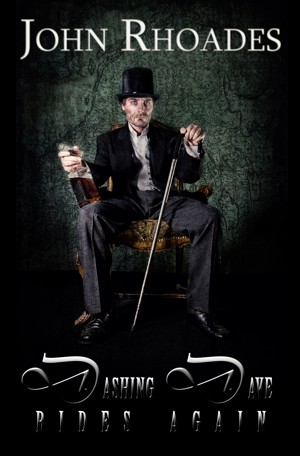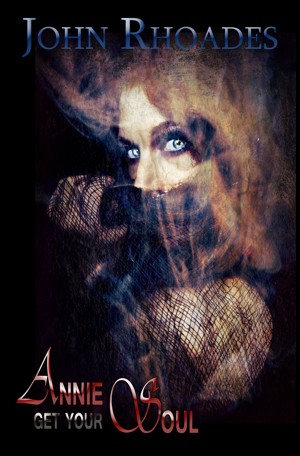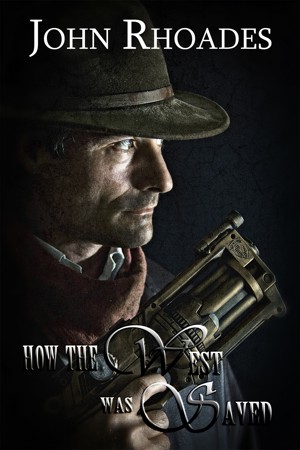Interview with John Rhoades
Published 2013-11-14.
When did you first start writing?
Ah, Sherman, prepare the Wayback Machine! It all started in kindergarten, believe it or not. That is not to say I was some kind of savant. I think the actual term you may be looking for is “idiot.” The truth was, I was a rather slow kid. I like to think maybe I was methodical, but I suspect dumb is probably more accurate. At any rate, I didn’t pick things up that quickly. But I did have a couple of great teachers. My kindergarten teacher and my first grade teacher were good friends, and for some unknown reason, they took a special interest in me, cultivating my study of the alphabet and starting me solidly on a path to literacy that may not have come otherwise. But as with all school children, my writing consisted mainly of essays on summer vacations. Then flash forward to the fifth grade. My teacher at that venerable grade allocated a portion of our class each week to weekly writing assignments. But she did it with a strange twist. She wanted us to write fiction! I had never conceived of such a thing, but I found I liked it. The notion of becoming a writer did not occur to me until high school, though (or maybe it was middle school; I never could keep track of those things). Inspired by "Empire Strikes Back," a buddy and me decided we would write books one night (about bounty hunters of all things), then read each other’s books the next day. For any who has ever written a book, you know how ridiculous a proposition this was to write an entire novel in a single evening. But we were kids and didn’t know better. And as you might expect, we didn’t write books that night. However, the idea stuck with me, and just a short century or so later, that idea finally struck pay dirt (figuratively speaking of course) with the publication of my first novel, "How the West Was Saved."
What is your writing process?
I think my writing process can best be described as organized chaos, minus the “organized” part. Basically, I like to draw up an outline that I treat more as a suggested route to follow than a hard and fast map that will take me from point A to point B. This gives the story an opportunity to live and breathe on its own, which makes the writing process for me as fun and exciting as I hope the reading experience is for my readers. But this guidance-less process is not without its consequences. Because of the way the second book in my Mercantile Chronicles series (“Annie Get Your Soul”) ended, I threw out my idea for the third book and wrote “Dashing Dave Rides Again” instead. I then went on to change the character of Dashing Dave so profoundly that I had to scrap half of the first draft of my manuscript. And still that is not enough for me! Even as I write this, two weeks out from publication, I am considering a change to the last chapter of “Dashing Dave” that will be a minor change for “Dashing Dave,” but a game changer for the series. Is this madness? Probably! But it also makes the writing process much more interesting, and in the end I figure that if it isn’t fun for me, it won’t be for the reader.
Why do you write fantasy?
My dad introduced me to "The Hobbit" when I was a kid, and ever since, I’ve been a fan of fantasy fiction. I couldn’t read enough Robert Jordan or Terry Brooks or Christopher Stasheff, who in a way is a big inspiration for my Mercantile Chronicles series (Christian motif, situational humor, talking horse). But I think the real reason that fantasy has always appealed to me is its spirituality. Not only does it allow for higher beings, but magic and specifically the sources of magic (i.e., gods) are part of its underlying framework. My own Christianity is important to me and influences my writing as it does every other aspect of my life (except maybe my driving [sorry, God]). So it seemed natural to marry my faith with my writing, and in the case of the Mercantile Chronicles, my passion for American history as well.
What do you enjoy most about writing?
The surprises. It amazes me how things just intertwine and work together sometimes. For example, when I wrote "How the West Was Saved," I never expected it to be more than a standalone book. For the most part, I started my main Mercantile Chronicles series with the second book, "Annie Get Your Soul." And even as I completed that second book, I still meant the first book to be standalone. But then I wrote "Dashing Dave Rides Again," and it incorporates so many elements from "How the West Was Saved" that I never expected to use again. And everything just flows. The characters take on a life of their own, with their own memories, strengths, weaknesses, and pasts, and they react to events in strange and unpredictable ways that I never could have conceived otherwise. It kind of makes me wonder what I’m doing there at all. Just let the characters live their own stories. They’re far better at it than I’ll ever be.
What are you working on next?
I am getting ready to publish "Dashing Dave Rides Again" on Thanksgiving. After that, I will be continuing my Mercantile Chronicles series with its fourth installment, titled “An American Soul Hunter in King Herod’s Court.” The Mercantile Chronicles is rather an interesting development for me. When I conceived "How the West Was Saved," I really had no intention of writing more than the one book about Jim Mercantile. Heck, I really had no intention of writing any books about Jim Mercantile. He was originally a short story idea at best. But when I started to develop him, I found that he actually had much more to say and do than could be contained within a short story. So "How the West Was Saved" the novel was born. And soon after that, I found myself thinking in terms of other adventures Jim and his venerable best pal Typhoid might have together. But at this time, all the adventures, like "How the West Was Saved," were stand-alone stories. One such adventure was "An American Soul Hunter in King Herod’s Court," a story that followed Jim back in time to the time of Jesus. But of course, that introduced other problems, the primary of which was explaining how the heck Jim went back in time. So I figured, I have to at least have a lead-up book to "American Soul Hunter" to get Jim back to the time of Jesus. But then, doing what I seem to do best, I complicated things. I thought (Spoiler Alert! You might want to cover your ears as you read what comes next.), what if Jim is not successful in his mission back in time? Perhaps through a selfish action, he doesn’t do what he is supposed to do, and as a result, he comes back to his own time to find a world radically changed from the one he left. It was too tantalizing an opportunity for me to simply let go, so the fifth book in the series, "1884," was born. And if you read carefully, you will see glimpses of "1884" in both "Annie Get Your Soul" and "Dashing Dave Rides Again."
How do you approach cover design?
In this regard, I have to consider myself the luckiest man in the world. I consider the quality of the cover to be almost as important as the quality of the book itself. This is the first impression people receive of the book, and while we don’t like to admit it, most of us (myself most assuredly included), do judge books by their covers. However, back to the lucky part. I married a beautiful woman who is a phenomenal photographer and graphic artist. Her name is Jennifer, and she operates under the professional name Spoken in Red (www.spokeninred.com). She designs and creates the covers for my books, and quite frankly, I think she’s amazing. You should have seen my attempt at the cover for "How the West Was Saved." It was pathetic. It looked like a really bad cartoon. So I suppose my advice would be, marry a talented artist. Or if that's a bit too extreme for you, I suppose you can always hire one.
Smashwords Interviews are created by the profiled author or publisher.
Books by This Author
Dashing Dave Rides Again
by John Rhoades
Torn by grief, Dashing Dave McCoy, a man once defined by his faith, has turned his back on God and the world he once fought so fervently to protect. But now his old student Jim Mercantile is in trouble, and Dave is given a choice: let go of his anger and embrace the destiny God has defined for him, or let the world fall into darkness... Well, Dave was looking to buy a new lantern anyway.
Annie Get Your Soul
by John Rhoades
Six months ago, U.S. Marshal James Mercantile defeated the demon Annie in a battle for the soul of Nevada. Now Annie is back, allied with a powerful organization of sorcerers and more determined than ever to possess Jim's soul. And this time Annie will have Jim's soul, even if she has to destroy the world to get it.
How the West Was Saved
by John Rhoades
Nevada 1882. A gubernatorial candidate's daughter vanishes. Now soul hunter Jim Mercantile must track her down. But as Jim investigates, he discovers that more is at stake than one missing girl. This conspiracy stretches from the capitol in Carson City clear to the gates of Hell. And if Jim doesn't rescue the girl by election day, those gates will open and Hell will be unleashed upon the Earth.




